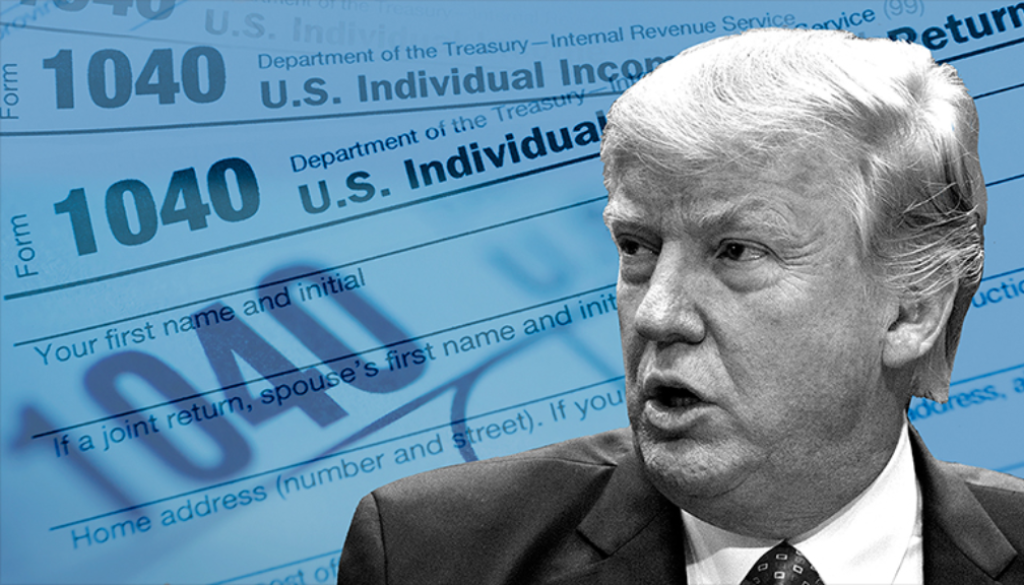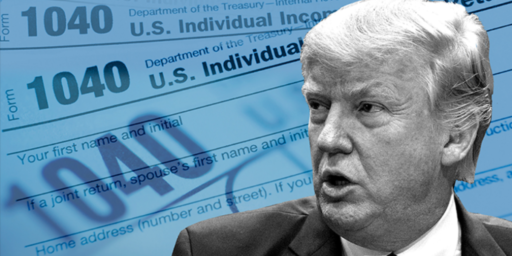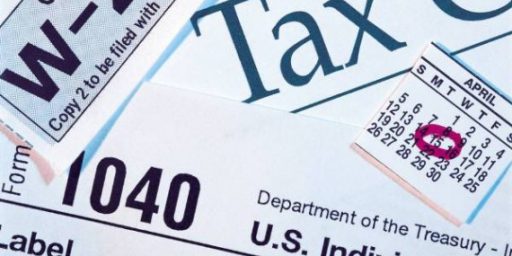Federal Judge Blocks California Law Requiring Disclosure Of Candidate Tax Returns
Late last week, a Federal Judge in California placed on hold a state law requiring candidates to provide copies of their tax returns.

Following up on a ruling from the bench last month, a Federal Court Judge in California has issued an order blocking a state law requiring candidates for President to provide the public with copies of their tax returns:
(CNN) A federal judge in California blocked a state law that requires candidates for president to disclose income tax returns before their names can appear on the state’s primary ballot.
The ruling is a win for President Donald Trump, who is resisting efforts to turn over his tax returns in a battle largely playing out in the courts.
US District Judge Morrison C. England Jr. of the Eastern District of California on Tuesday wrote “while this Court understands and empathizes with the motivations that prompted California” to pass the law, “the Act’s provisions likely violate the Constitution and the laws of the United States.” England noted that it is not the court’s role “to decide whether a tax return disclosure requirement is good policy or makes political sense.”
The judge said the law would set a dangerous precedent and become a slippery slope for other kinds of disclosures. He also said it presents a “troubling minefield ” that would permit a state to make its own demands.
Last month — ruling from the bench — England, a George W. Bush appointee, signaled he was inclined to rule in favor of Trump.
California Secretary of State Alex Padilla announced Tuesday that he plans to appeal the judge’s decision.
“California will appeal this ruling and we will continue to make our thorough, thoughtful argument for stronger financial disclosure requirements for presidential and gubernatorial candidates,” Padilla said in a statement, adding that the law is “fundamental to preserving and protecting American democracy.”
Lawyers for Trump had argued in court papers that the law adds an “unconstitutional qualification” to the fixed set of qualifications for the presidency set forward in the Constitution and violates the First Amendment.
California Democratic Gov. Gavin Newsom signed the state’s Presidential Tax Transparency and Accountability Act in July.”The United States Constitution grants states the authority to determine how their electors are chosen, and California is well within its constitutional right to include this requirement,” he said in a statement at the time.
A similar lawsuit was filed in August by Republican voters along with the Republican National Committee and the Republican Party of California, who argue that this a political maneuver that takes voting rights away from Trump’s supporters.
After the initial lawsuit was filed, Newsom responded.”There’s an easy fix Mr. President — release your tax returns as you promised during the campaign and follow the precedent of every president since 1973,” the governor tweeted.
Trump’s team of private lawyers has been on the offensive in recent weeks, filing lawsuits to thwart attempts by Democrats to see his tax returns. They’ve filed a handful of lawsuits in federal courts across the country, mainly to stop House Democrats from seeking the tax returns through the Trump family and the Trump Organization’s banks, an accounting firm or under a New York state law.
In court last month, England noted that while the law covers all presidential candidates, it was aimed at Trump.”The elephant in the room is President Trump’s tax returns,” England said.”Trump spawned this when he broke 50 years of tradition” by not releasing them, argued Peter Chang, a lawyer for California.
A lawyer for Trump, Thomas McCarthy, countered that the law “handicaps” the candidate who wants to keep tax returns private. He also argued the law could create a slippery slope that might lead to more extreme candidate disclosures like mental and physical information.
As noted, the ruling handed down last week expands upon the ruling from the bench that Judge England, who was appointed to the Court by George W. Bush in 2002 and served as Chief Judge of the U.S. District Court for the Eastern District of Virginia from 2012 to 2016, had issued late last month. That ruling, though, was temporary while this ruling has resulted in an injunction that will remain in place until a final ruling by the court or until the stay is overturned by a higher court. One thing this means is that the first deadline for compliance, which would have come in November in order to appear on the March primary ballot will most likely pass without candidates having to comply with the ruling. Effectively, that probably means the law will have no impact on the 2020 election whatsoever since it does not apply to General Elections.
In any case, Judge England bases his decision on what basically amounts to accepting each of the four arguments advanced by Trump and the other Plaintiffs seeking to strike down the law.
First, the Court finds that the law unconstitutionally adds to the qualifications clause of the Constitution. As I have previously argued in posts regarding proposed laws similar to the one that passed in California — see here, here, and here — the court found that the law violates the provision to the Constitution that lays out the qualifications necessary to serve as President, which can be found at Article II, Section 2 Clause 4, similar provisions for members of the House and Senate can be found at Article I, Section Two, Clause 2 and Article I, Section Three, Clause 3 respectively. Those provisions, of course, set forth the age and residency requirements that a candidate must meet to be eligible to serve in the respective offices to which they apply.
In US Term Limits v. Thornton, the Supreme Court ruled on the constitutionality of a Missouri law that, much like the California law and tax returns, purported to use ballot access laws as a backdoor to imposing term limits on Members of Congress by denying them ballot access if they have served more than the permitted number of terms, which in that case was three terms for Members of the House and two terms for Senators. Such candidates could still seek reelection via a write-in campaign, but they could not run as either the nominee of a particular party or an Independent candidate. The Court ruled that this provision, which actually became a provision of the state Constitution via a ballot measure, violated the U.S> Constitution because it imposed requirement for holding the office of Congressman or Senator beyond those set forth in Article One, Sections Two and Three, and the Seventeen Amendment, which set forth the residency and age limitations for holding those offices.
The majority opinion written by Justice John Paul Stevens goes through the history behind the qualifications clauses for Congress, the powers of the states to regulate ballot access and the Tenth Amendment argument that was made in favor of the law before ultimately concluding that the attempt to impose term limit by regulating ballot access was unconstitutional. In his ruling, Judge England finds that the Court’s decision in Thornton applies here and that, while California claimed that the tax return disclosure was framed as a ballot access law it was, in reality, a law that unconstitutionally added to the qualifications clause of the Constitution.
In addition to this ground, Judge England also found that the California law was defective for several other reasons. First, he found that the law violates the First Amendment in that it unconstitutionally places an undue burden on the ability of persons to qualify for the ballot in California without justification. He also found that the law violates the Equal Protection Clause of the Fourteenth Amendment for largely the same reason. In both cases, he found that the justifications put forward by the state for why providing copies of tax returns was at all relevant to qualifying for ballot access did not serve a proper public purpose, and most certainly did not fall within the “time, place, and manner” regulations that states are permitted to put in place regarding elections.
Finally, as he had ruled from the bench, the law violated the Ethics in Government Act which requires Federal officials and candidates for office to provide a detailed financial report, something which Trump did early in his 2016 Presidential run. That law does not require, however, that candidates or government officials make their tax returns public. The argument, therefore, is that the California law effectively violates the Supremacy Clause of the Constitution because it purports to impose requirements on candidates that exceed those imposed by Federal law and because it purports to speak on a subject that Congress has already spoken on.
On its face, Judge England’s ruling appears to be solid on all four grounds on which it is based. Nonetheless, as noted above, California has announced that it will appeal the matter. First, of course, that appeal will go to the Ninth Circuit Court of Appeals and from there, if necessary, to the Supreme Court. I don’t expect the result will be any different.
Here’s the opinion:
Trump v. Padilla Order by Doug Mataconis on Scribd



As much as I and the rest of this country want to see Trump’s tax returns, this is probably the right decision. I can imagine spiteful Republican-controlled legislatures just making up tons of sh*t laws to stymie a Democratic candidate.
I’m a little more excited about the judge in New York saying he had to release 8 years of them. And the judge’s comments were pretty effing spectacular.